If you’re looking to add protein to your smoothies, you’ve come to the right place. We all know the importance of protein in our diets, and what better way to get it than through delicious smoothies? But forget about those protein powders with their long list of hard-to-pronounce ingredients. Let’s talk about the best protein sources for smoothies that come from natural foods.
Peanut butter, coconut milk, flax seeds; these are just a few of the tasty and protein-packed ingredients you can use. Not only are these whole food proteins healthier, they also make your smoothies taste way better. So, if you’re ready to level up your smoothie game and fuel your body with nutrient-dense proteins, let’s dive in.
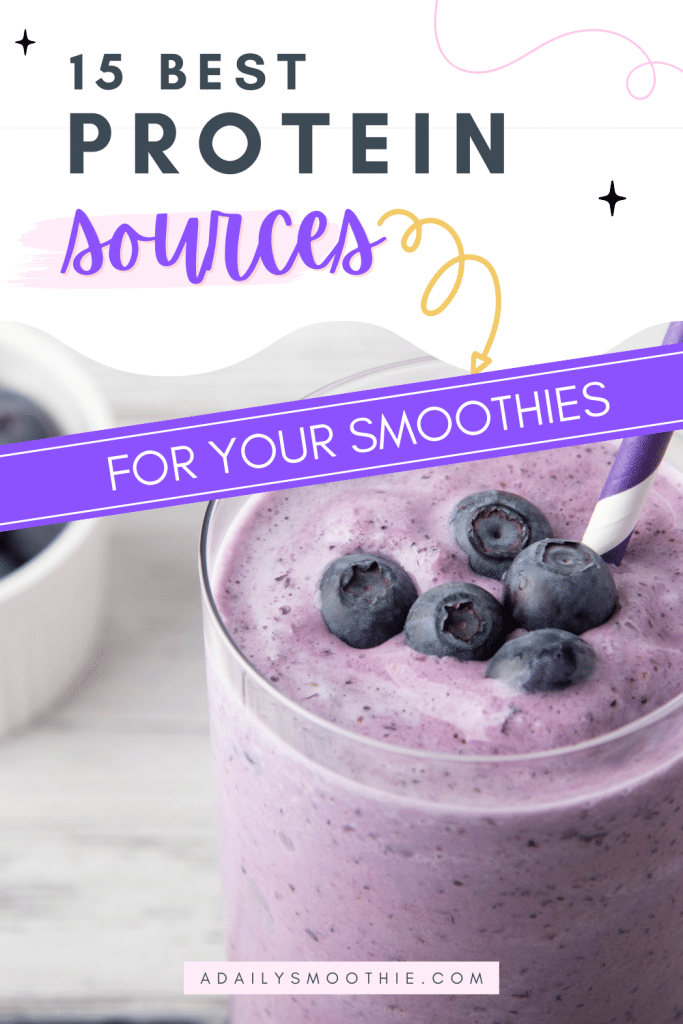
Table of Contents
Benefits of Adding Protein to Smoothies
Protein is Important for Smoothies
Protein is an essential nutrient that plays a crucial role in our overall health and well-being. When it comes to smoothies, adding protein can bring a myriad of benefits. In this section, we will explore why protein is important for smoothies and how it can enhance your daily nutrition.
1. Boosts Satiety and Helps with Weight Management
One of the primary benefits of adding protein to your smoothies is its ability to keep you feeling fuller for longer. Protein takes longer to digest compared to carbohydrates, which means it can help control your hunger and prevent overeating throughout the day. By incorporating protein into your smoothies, you can curb cravings and support your weight management goals.
2. Supports Muscle Repair and Growth
Protein is the building block of muscles, and it plays a vital role in repairing and building new tissues. Whether you’re an athlete looking to enhance performance or simply aiming to maintain a healthy body composition, protein in your smoothies can aid in muscle repair and growth. This is especially important after intense workouts, as protein helps replenish and rebuild the muscles.
3. Provides a Nutrient Boost
Smoothies are a fantastic way to pack in essential nutrients, and adding protein can further enhance their nutritional value. Protein-rich ingredients such as nuts, seeds, and dairy products not only provide protein but also offer a wide range of vitamins, minerals, and antioxidants. By incorporating these protein sources into your smoothies, you can create a delicious and nutritious meal or snack.
Protein Requirements for a Balanced Diet
Now that we understand the benefits of adding protein to smoothies, let’s explore the protein requirements for a balanced diet. The amount of protein an individual needs may vary based on factors such as age, sex, activity level, and overall health. However, the general recommendation from the Mayo Clinic for sedentary adults is to consume around 0.8 grams of protein per kilogram of body weight.
For example, if you weigh 150 pounds (68 kg), you would aim to consume approximately 55 grams of protein per day. This can easily be achieved by incorporating protein sources into your meals and snacks, including smoothies.
It’s important to note that individuals with specific dietary requirements, such as athletes or those following a vegetarian or vegan diet, may have higher protein needs. Consulting with a healthcare professional or registered dietitian can help determine your specific protein requirements.
Top Protein Sources for Smoothies
When it comes to boosting the protein content of your smoothies, there are plenty of delicious and nutritious options to choose from. Whether you’re looking to fuel your workout or simply add a healthy protein punch to your morning routine, these ingredients are sure to satisfy your taste buds and keep you feeling satisfied throughout the day.
1. Peanut Butter
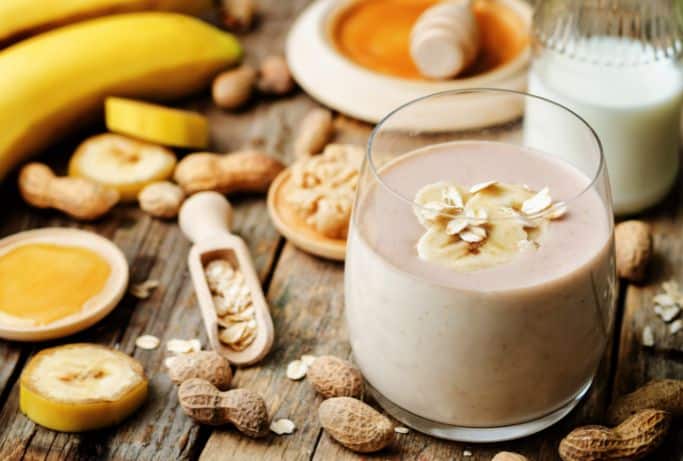
Peanut butter not only adds a rich and creamy texture to your smoothies, but it’s also a great source of protein. With around 8 grams of protein per 2 tablespoons, it’s an easy way to amp up the nutritional value of your drink. Plus, it provides healthy fats and fiber, making it a filling addition to any smoothie.
Pro tip: Opt for natural peanut butter without added sugars or oils for the healthiest option.
Try this: Peanut Butter Banana Smoothie
2. Coconut Milk
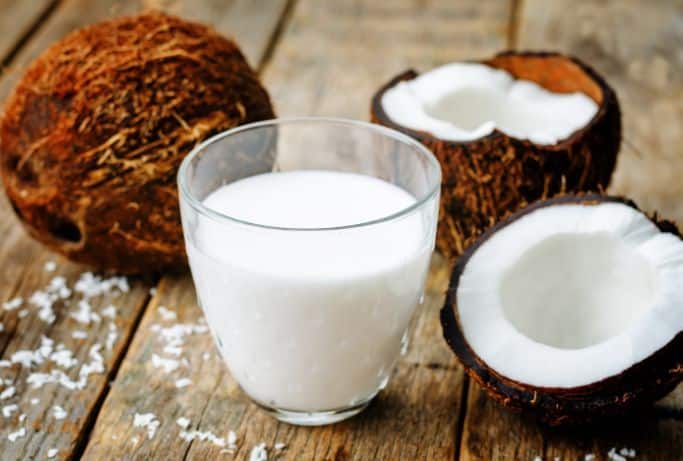
If you’re looking for a dairy-free alternative to milk, coconut milk is a fantastic choice. Not only does it lend a tropical flavor to your smoothies, but it also provides a creamy consistency and a dose of healthy fats. With around 5 grams of protein per cup, it’s a great option for those following a plant-based diet.
Pro tip: Look for unsweetened coconut milk to keep added sugars in check.
Try this: Coconut Pineapple Smoothie
3. Flax Seeds
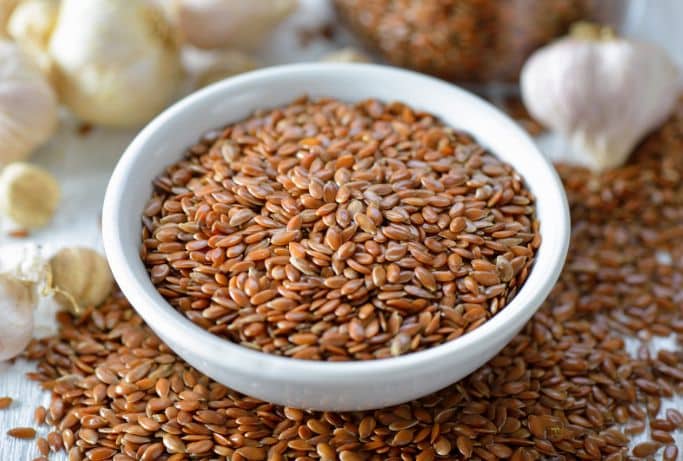
Flax seeds are tiny powerhouses when it comes to nutrition. Rich in omega-3 fatty acids, fiber, and protein, these little seeds pack a big punch. Just 2 tablespoons of flax seeds offer around 4 grams of protein, making them an excellent addition to your smoothies for an extra nutritional boost.
Pro tip: Grind flax seeds before adding them to your smoothie to enhance nutrient absorption.
4. Seaweed

While it may sound unconventional, seaweed is a surprisingly nutrient-dense ingredient to add to your smoothies. Not only does it provide a unique umami flavor, but it’s also loaded with protein, vitamins, and minerals. Try adding a small amount of dried seaweed or seaweed flakes to your next smoothie for a savory twist.
Pro tip: Ensure you’re using high-quality seaweed sourced from reputable brands.
5. Oats

Oats are a staple in many breakfast bowls, and for a good reason. They’re not only an excellent source of fiber but also offer a decent amount of protein. Just half a cup of oats provides around 5 grams of protein, making them a fantastic choice for adding substance and texture to your smoothies.
Pro tip: If you prefer a smoother texture, consider blending the oats first before adding the remaining ingredients.
Try this: Peanut Butter Oatmeal Smoothie
6. Chia Seeds

Chia seeds have gained popularity over the years, and for good reason. These tiny seeds are packed with protein, fiber, and omega-3 fatty acids. With nearly 5 grams of protein per ounce, chia seeds are a simple and nutritious addition to any smoothie.
Pro tip: Soak chia seeds in water for a few minutes before adding them to your smoothie to create a gel-like consistency.
Try this: Chia Strawberry Smoothie
7. Dairy Milk

Good old-fashioned milk is a classic choice for adding protein to your smoothies. Whether you prefer dairy or plant-based options like almond or soy milk, they all offer a solid amount of protein. Just one cup of milk provides around 8 grams of protein, making it an easy and accessible choice.
Pro tip: Opt for unsweetened versions to avoid unnecessary added sugars.
Try this: Tropical Breakfast Smoothie
8. Pumpkin Seeds

Pumpkin seeds are not only a popular snack but also a fantastic addition to your smoothies. With around 3 grams of protein per tablespoon, these little seeds are packed with nutrients like magnesium, zinc, and omega-3 fatty acids. They add a delightful crunch and a subtle nutty flavor to your smoothies.
Pro tip: Consider roasting pumpkin seeds for added depth of flavor before blending them into your smoothies.
9. Almond Butter
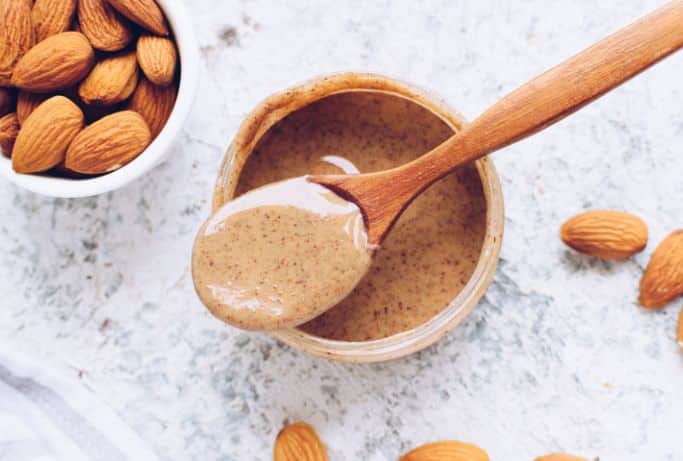
Similar to peanut butter, almond butter is a creamy, protein-rich ingredient that can take your smoothies to the next level. With around 7 grams of protein per 2 tablespoons, almond butter adds a deliciously nutty taste and a dose of healthy fats.
Pro tip: Look for almond butter made from 100% almonds for the most natural and nutritious option.
10. Quinoa

Quinoa is a versatile grain and a fantastic plant-based protein source. With around 8 grams of protein per cup, cooked quinoa adds a hearty and filling element to your smoothies. It pairs well with a variety of flavors and provides a nutritional boost to keep you energized.
Pro tip: Cook quinoa ahead of time and store it in the fridge for quick and easy smoothie prep.
11. Yogurt

Yogurt is a staple in many smoothie recipes, and for good reason. In addition to adding protein, it makes smoothies thick and creamy. With around 11 grams of protein per cup, yogurt adds a tangy flavor and a boost of probiotics for a healthy gut.
Pro tip: Opt for plain yogurt without added sugars or artificial sweeteners to keep your smoothie as nutritious as possible.
Try this: Peach Yogurt Smoothie
12. Soy Milk
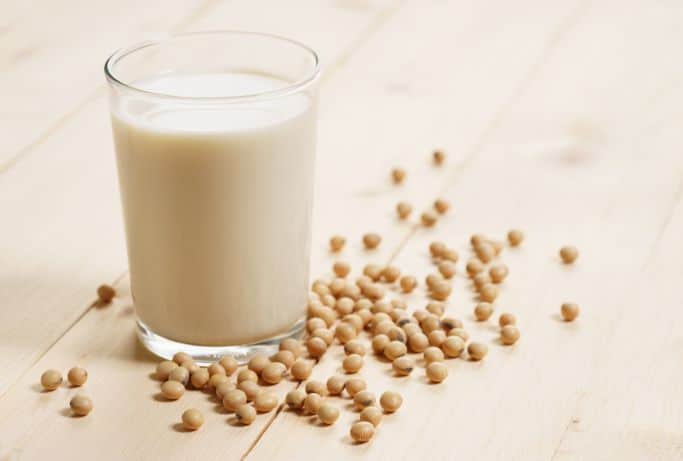
Soy milk is a popular alternative to dairy milk, especially for those following a plant-based lifestyle. With around 8 grams of protein per cup, soy milk offers a creamy texture and a balanced nutritional profile. It’s a versatile option that pairs well with a variety of fruits and flavors.
Pro tip: Choose unsweetened soy milk to avoid added sugars and flavorings.
13. Sunflower Seeds

Sunflower seeds are tasty as a snack and as a crunchy topping for your smoothies. With around 1.5 grams of protein per tablespoon, these seeds provide a satisfying crunch and a range of nutrients, including copper, vitamin E, and folate.
Pro tip: Opt for shelled sunflower seeds to save time and effort when blending them into your smoothies.
14. Walnuts

Walnuts are a great source of protein that’s also good for the liver. With around 4 grams of protein per ounce, walnuts add a rich and nutty flavor to your smoothies. They also provide healthy fats, fiber, and antioxidants for an extra nutritional punch.
Pro tip: Consider toasting walnuts before adding them to your smoothies to enhance their natural flavor.
15. Hemp Seeds
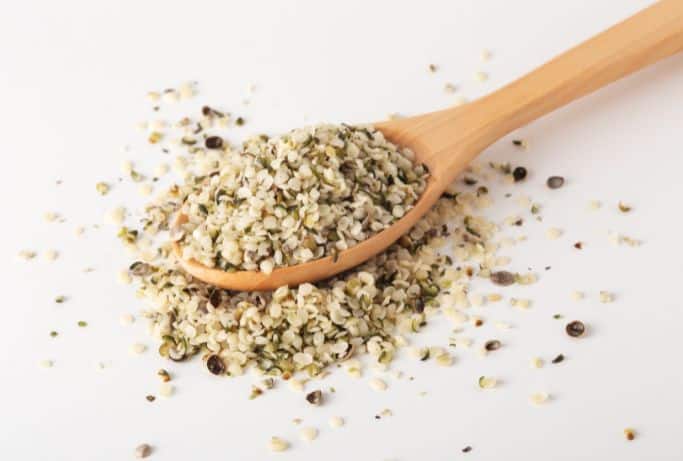
Hemp seeds are a nutritional powerhouse, packed with protein, omega-3 fatty acids, and an array of vitamins and minerals. With around 10 grams of protein per 3 tablespoons, hemp seeds add a nutty taste and a creaminess to your drinks.
Pro tip: Add hemp seeds to your smoothies for a boost of plant-based protein, essential fatty acids, and a nutty flavor without altering the drink’s consistency.
When it comes to boosting the protein content of your smoothies, opting for real food sources is always the best choice. Unlike powders that may contain processed ingredients and chemicals, real food options offer a more natural and tastier way to get the protein you need.
From peanut butter and coconut milk to flax seeds and oats, there are plenty of protein-packed ingredients to choose from. Don’t forget about the benefits of pumpkin seeds, almond butter, and quinoa. And if you’re looking for some added nutrients, consider adding sunflower seeds, walnuts, or cacao nibs to your smoothie.
The possibilities are endless when it comes to creating delicious and nutritious protein-rich smoothies.
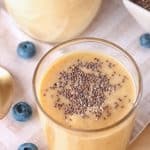
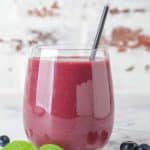
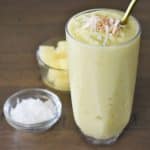

Leave a Reply